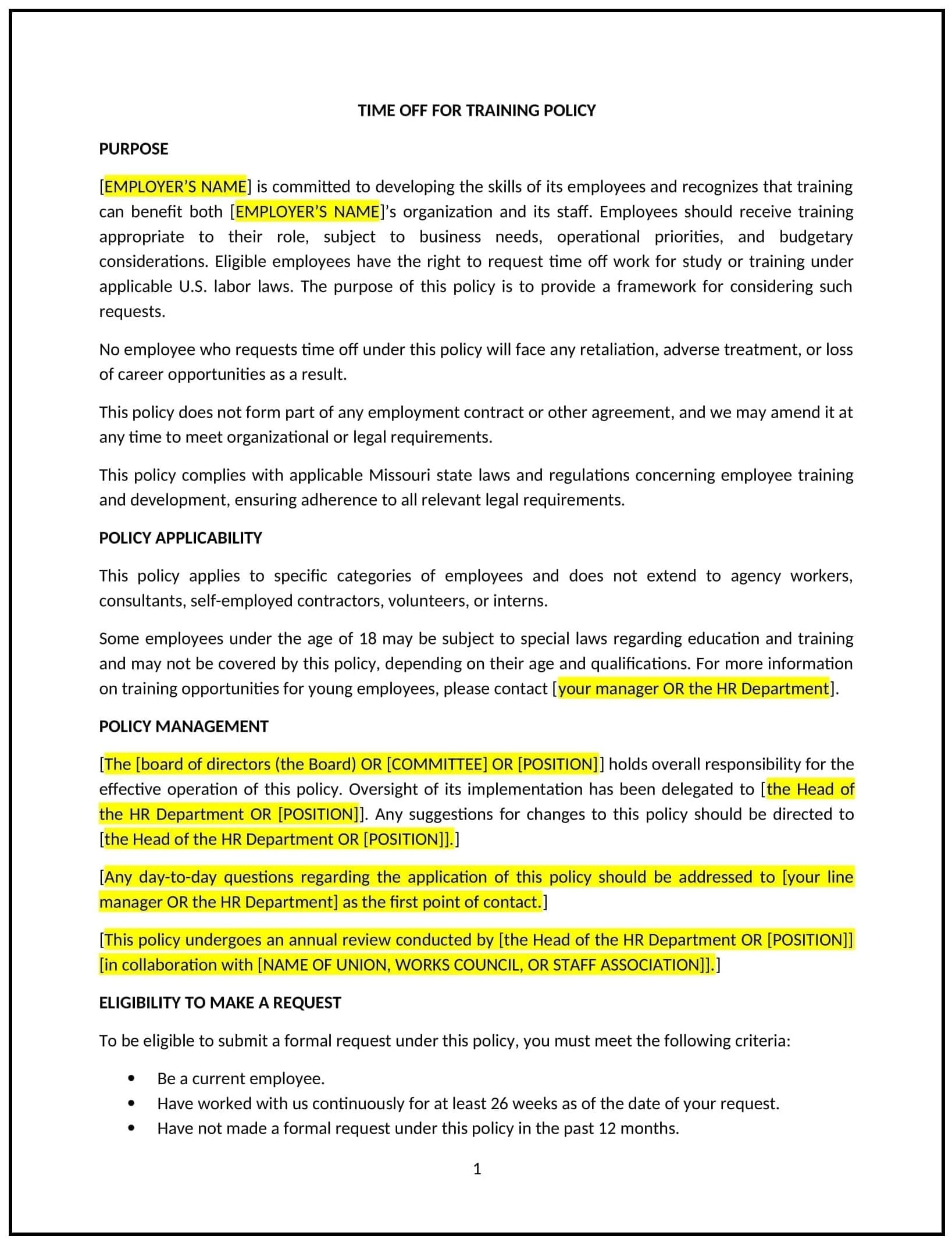Time off for training policy (Missouri): Free template
Got contracts to review? While you're here for policies, let Cobrief make contract review effortless—start your free review now.

Customize this template for free
Time off for training policy (Missouri)
A time off for training policy helps businesses in Missouri provide employees with the opportunity to enhance their skills, knowledge, and competencies through external or internal training programs. This policy outlines the procedures for requesting time off for training, the conditions under which time off is granted, and the potential reimbursement for associated costs. It is designed to foster employee development while balancing the business’s operational needs.
By adopting this policy, businesses can ensure employees are supported in their professional growth, leading to improved job performance, engagement, and overall business success.
How to use this time off for training policy (Missouri)
- Define eligible training programs: Clearly specify what types of training are eligible for time off, such as job-specific training, professional certifications, conferences, or workshops. Include any required qualifications for training programs to be considered.
- Set eligibility criteria: Establish the criteria for employees to be eligible for time off for training, such as the minimum length of service, full-time status, or performance requirements. Define whether part-time employees are also eligible.
- Request process: Outline how employees should request time off for training, including how much advance notice they need to provide, the documentation required (e.g., training registration or agenda), and the procedure for obtaining approval.
- Determine paid vs. unpaid leave: Specify whether employees will be paid for time off taken for training or whether the leave will be unpaid. Some businesses may cover the cost of training-related expenses, such as registration fees or travel costs.
- Address work coverage: Clarify expectations for managing workloads when employees are on training leave, including whether employees are expected to make up the time or how their responsibilities will be handled during their absence.
- Support for professional growth: Encourage employees to pursue training that will benefit both their professional development and the business. Offer guidance on relevant training opportunities that align with company goals and employee career paths.
- Review regularly: Periodically review and update the policy to ensure it aligns with business needs, employee feedback, and any changes in Missouri state law or industry standards related to professional development.
Benefits of using this time off for training policy (Missouri)
This policy provides several benefits for businesses in Missouri:
- Enhances employee skills: Allowing employees to take time off for training helps them gain new skills and knowledge, which can improve their performance, productivity, and ability to contribute to the company’s success.
- Boosts employee engagement: Supporting professional development shows employees that the company is invested in their growth, leading to higher job satisfaction and retention rates.
- Improves business performance: Well-trained employees are more efficient, adaptable, and innovative, which can contribute to improved overall business performance and competitiveness in the market.
- Fosters a culture of learning: A clear policy on training time off encourages continuous learning and improvement, creating a workplace culture where development is prioritized, and employees are motivated to expand their skills.
- Supports retention and recruitment: Offering time off for training and development makes the company more attractive to top talent and helps retain valuable employees by offering opportunities for career growth.
- Aligns employee development with business goals: By providing training that aligns with business needs, employees become better equipped to meet company objectives and contribute to long-term success.
Tips for using this time off for training policy (Missouri)
- Communicate the policy clearly: Ensure that all employees are aware of the policy, including how to request time off for training, the types of training covered, and any requirements for approval.
- Set clear guidelines for approval: Define the approval process for training requests, ensuring that managers review and assess whether the training aligns with the employee’s role and the company’s goals.
- Track training requests: Maintain records of training requests and approvals, ensuring that employees receive the appropriate time off and that the business can plan for any necessary work coverage.
- Provide guidance on relevant training: Offer employees resources or recommendations for training programs that align with their professional goals and the company’s needs, such as certifications or workshops that can benefit both the employee and the organization.
- Encourage timely requests: Encourage employees to submit training requests well in advance to allow for proper planning and to minimize disruptions to workflow or project timelines.
- Review regularly: Periodically assess the effectiveness of the policy and make adjustments based on employee feedback, business needs, or changes in industry trends.